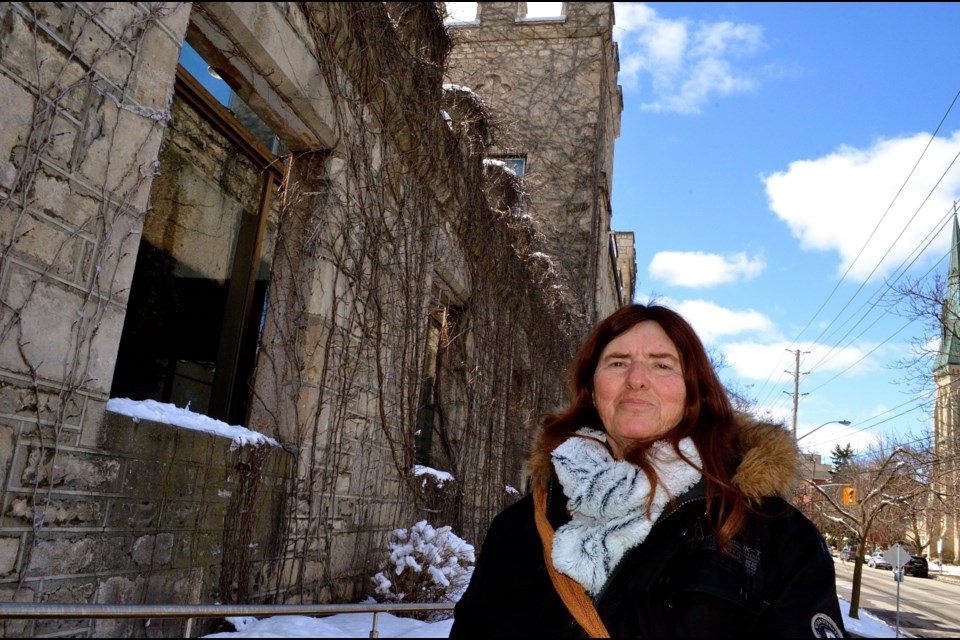Plaques, parks and street signs bear the names of many of Guelph’s founding fathers, politicians and captains of industry, but local historian Bonnie M. Durtnall has compiled a list of infamous names that history has all but forgot.
“I was researching Guelph’s labour history and I was seeing these interesting little tidbits,” said Durtnall. “I thought, that’s neat and that’s neat. I think it was Dawn Matheson who suggested I put them all together in a little book. So, that is what I did.”
Durtnall scoured the microfiche collection at Guelph Public Library, the archives at the Guelph Civic Museum and other sources to assemble a book that looks at nearly two centuries of Guelph’s shady past.
“If you really want to know the history of an event you have to sit down and read the papers of the time,” she said. “If you read the local paper and read all the columns you learn about the whole event and it is much more real.”
The lengthy-titled Bawdy Houses, Bums & Illicit Booze: Prostitution, Vagrancy & Murder - Guelph 1870 – 1953 includes eye-witness accounts and newspaper reports of people and events that don’t typically make the official pages of Guelph’s early history.
“It is fascinating except you can go blind looking at microfilm,” said Durtnall. “The original came out in 2004 and then I got back into researching labour disputes and stuff like that. I generally forgot about it until this summer past.”
Some local history buffs asked her about getting copies of the book so she updated her research and printed a second edition.
“My specialty is industrial history and labour history but this one is a fun book,” she said. “I am lucky because I know local historian Ed Butts and he is good at that. He edited the second draft.”
Durtnall was born in Toronto in 1952 the second youngest of two brothers and five sisters. She moved to Guelph when she was 19 years old.
“I came here for university in 1971,” she said. “I took English and Latin for my BA and then history for my master’s. I thought about being a professor but I didn’t take my PhD and got caught up in doing other stuff.”
She moved away from Guelph a few times but always found her way back.
“I moved to Calgary then I moved back to Guelph,” she said. “I was living in Kingston for a bit then I moved back to Guelph.”
Durtnall lives in the Ward where many of the colourful characters in her book such as gangster Joseph Veroni once lived.
“Most of the illegal activity related to running of booze and making of booze went on in The Ward and Veroni was the booze king of Guelph,” said Durtnall. “His brother Sam was also involved in the booze business but not in Guelph.”
Both brothers were murdered in 1922. Joseph was shot and thrown form a car in Niagara Falls and Sam was recovered from the Welland Canal wearing a pair of cement shoes. Joseph’s son Thomas carried on with the family business into the 1930s even after the family home on Alice Street was bombed. Authorities connected the murders and the bombing to notorious Hamilton-based gangster Rocco Perri.
Another colourful character in Durtnall’s book was Lena von Rosas a madam who ran a brothel on Crimea Street during the 1870s.
“She is a fascinating woman because she really didn’t give a damn,” said Durtnall.
“She wore silks and was a high-class call girl. The papers back then described the madams and prostitutes as “soiled doves” but later on the language and the attitudes changed.”
Researching and writing the book was a fun distraction for Durtnall who maintains a labour history website called Labouring All Our Lives and provides research and web content related to industrial processes.
“I am retired now but I have done that for about 15 years,” she said. “My stuff is scattered all over the net. Right now I am putting together a book called We Used to Make Things in Guelph. It focuses on industries that have been in Guelph and disappeared.
